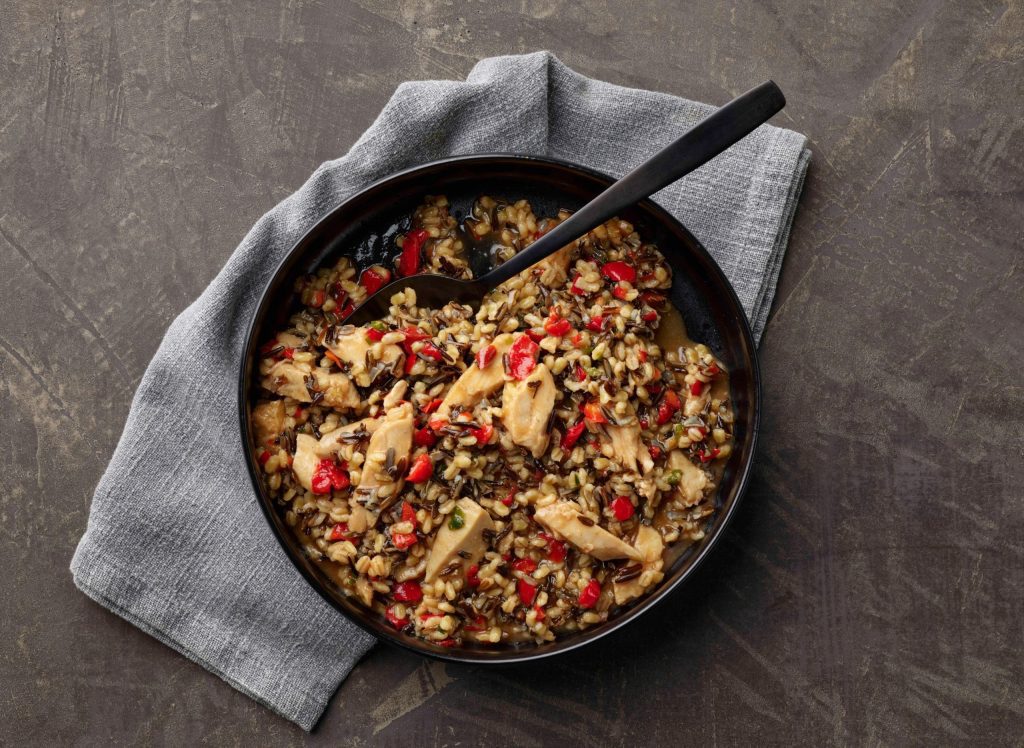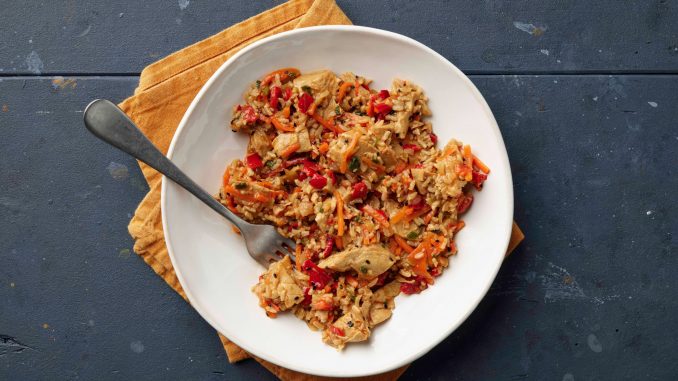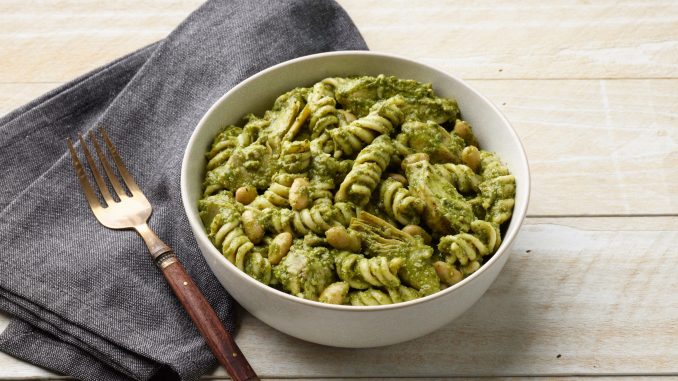Finding Success in Salads
June 1, 2021 | 7 min to read
The deli salad category, valued at over $4.1 billion, has shown resilience despite a slight decline from the previous year. While potato, chicken, macaroni salads, and cole slaw have seen growth, consumer trends influenced by COVID, such as a focus on healthier eating, are reshaping preferences. Millennials increasingly seek plant-based options due to environmental concerns, prompting innovations like Mexican street corn dips. Marking products with dietary labels can simplify shopping for health-conscious consumers.

The salad category in delis has always been a stronghold, and although there has been a shift in prepared food formats due to COVID, sales have remained on the upswing.
According to NielsenIQ, deli salad sales totaled more than $4.1 billion in the 52 weeks ending April 3, 2021. This was down slightly from $4.5 billion in the same period a year prior. However, a number of categories in salads saw an increase in sales over the last year. Potato salad sales rose from $690 million to $709 million; chicken salad sales increased from $457 million to $484 million; macaroni salad rose from $236 million to $257 million and cole slaw was up slightly from $219 million to $226 million.
“COVID has had an impact on consumers with how they plan to eat now and into the future,” says Krystle Turnbull, product manager at Sandpoint, ID-based Litehouse Foods. “According to a Jan. 27, 2021 report from Numerator Health Trends, three in four shoppers plan to lead a healthier lifestyle in 2021. Also, 79% of consumers say they are proactively managing their health and wellness through their food and beverage choices, according to an April 8, 2021 webinar by IPSOS U.S. Syndicated Community Breaking Down the Pandemic Wall.”
Timely Trends
There have been a number of trends, such as intermittent fasting, keto, clean eating, gluten free and vegetarian, that have impacted the deli prepared food segment and salad category specifically.
According to Port Washington, NY-based NPD Group and Health Aspirations and Behavioral Tracking Service, these structured plans give consumers a sense of order at a time of uncertainty, so swapping in alternative proteins or unique dressing flavors could help draw in consumers with special diet restrictions.
“If a deli prepared food meets specific diet criteria, placing a sticker on packs that calls out that diet (i.e. keto-friendly, gluten free, etc.) could help consumers conveniently and quickly shop the deli as they are looking for their grab-and-go lunch options,” Litehouse’s Turnbull says.
Millennials, in particular, are reading labels more carefully and are more apt to purchase plant-based salads.
“This is due more to the environment than to health,” says Carl H. Cappelli, senior vice president of sales and business development at Don’s Prepared Foods, based in Schwenksville, PA. “These consumers are seeking plant-based items that are delicious, edgy, healthy and environmentally safe.”
Don’s Prepared Foods’ executive chef follows trends but also looks at what’s happening globally, then culls that down to North America.
“Looking at what’s edgy, cool, global, all-natural helps us develop innovative new items,” Cappelli says. “For example, Mexican street corn has become more popular so we made this into a dip. And with the upswing of charcuterie platters, we developed a chocolate cherry mascarpone cheese that can be mixed with fruit.”

Product Launches
As communities begin lifting restrictions and vaccination rates continue to rise, retailers are jumping back into foodservice and salads.
“Foodservice is beginning to come back,” Cappelli at Don’s Prepared Foods says. “People are seeking ready-to-eat items.”
Don’s Prepared Foods recently launched 11 items in the salad category, including five power bowls.
“Ready-to-eat deli salads are all natural and globally inspired,” Cappelli says. “COVID killed the food, salad and olive bar, but now that we know the virus is airborne, and not transmissible from touching, the self-serve bars are coming back.”
Last summer, Don’s Prepared Foods launched nine traditional salad cups in an eight pack, with each one 10 ounces for grab-and-go. In 2019 and 2020, the company introduced all natural bowls that can be paired with meat. Grain salads also remain hot sellers.
Today’s consumers are seeking convenience and variety, as much as they are looking for quality and value.
“Retailers nationwide are mixing up the status quo, from delis that are expanding to demonstrate a retailer’s prepared foods expertise, to departments that are moving to packaged-only, freeing up behind-the-glass labor costs,” says Nathan Roe, senior manager, Deli Strategy & Customer Marketing, Reser’s Fine Foods, Beaverton, OR. “We are closely watching the meal kit trend and looking for insights into why some consumers want a minimal amount of preparation, and some prefer a few cooking and heating steps. Fully assembled meal kits as well as those with just a few assembly steps are on Reser’s horizon.”
Where consumers are buying salads has changed a bit, with a shift away from the deli case and toward pre-packaged versions of the same or similar recipes.
“There is something quite comforting in the familiar tastes and flavors of deli salads, and we’re seeing that a whole new generation of consumers are discovering some classic deli salads and family favorites,” Roe says.
Consumers scan ingredient statements and want to feel good about what they’re eating.
“For the most part, they don’t want to sacrifice flavor or taste (or convenience), but we think there may be some flexibility on price,” Roe says. “There is a perception that fresh deli sides are already “clean”—so in many cases, we see the industry simply catching up with consumer expectations.”
Reser’s is constantly innovating, as consumers are always seeking to discover new tastes and products. In addition to new recipes, one of the company’s new items is a single, 3.5-ounce portion of Reser’s Garden Pasta salad.
“Single-serving sizes have been much in demand over the past year because they are convenient, pre-portioned and portable,” Roe says. “This ready-to-eat salad is made with mini penne pasta, red bell pepper, sun-dried tomatoes and shredded cheeses in a zesty vinaigrette dressing, with no artificial flavors or colors.”
Reser’s utilizes marketing communication tactics to educate, inform and create incentives for consumers to learn about and buy its products. Given the recent changes in shopping and consumption behaviors, the company has been adapting in-store vehicles to online environments.
“We want the consumer to connect with our products and brands digitally as well as in-store, so we’re available to help them learn more whenever they’re ready,” Roe explains.

Packaging Innovations
Each year, the trend for grab-and-go items increases in demand, and salads are no exception.
“Pre-packaged meals are now ever-present in the supermarket deli area to meet customer desires for quick, safe and fresh meal options,” says Keli Kinziger, associate product manager at Madison, WI-based Placon Corp. “The pandemic did not limit this growth and caused a surge in grab-and-go packaged items since the hot and cold buffets shut down and everything moved to online ordering, curbside service and delivery.”
When it comes to fresh, ready-to-eat items like salads, Placon’s innovations focus on security features, such as tamper-evident lids or film-sealing and material composition to maintain freshness.
“Grab-and-go offerings have driven the demand for tamper-evidence because more food items are pre-packaged and purchased separately from the deli counter,” Kinziger explains. “With curbside pick-up and increased delivery, people want to ensure their food has not been tampered with since the initial package date.”
Placon thermoforms its stock salad bowls with EcoStar, a post-consumer PET material made from curbside recyclables and ocean-bound plastic.
“Our salad and deli containers offer sustainability without sacrificing clarity because we know the ability to see your product is just as important as seeing that our packaging is sustainable,” she says.
Placon has several styles and sizes to choose from for packaging salads. Its Crystal Seal Tamper-Evident containers range from 8 to 64 ounces sizes. Part of the company’s tamper-evident salad bowl line, it is made with 25% post-consumer recycled PET. With a hinged, tamper-evident lid, the Crystal Seal salad bowls lock in freshness while providing a visual indication if someone previously opened the container.
“These are an excellent option for delis that are packaging salads for carry-out or pre-made meals,” Kinziger says.
Placon’s Fresh ‘n Clear GoCube’s are made of 75% post-consumer recycled PET and are an easy choice for pre-packaged meals.
“In addition, this product line has insertable trays to separate salad toppings to maintain the freshness of the ingredients,” Kinziger says. “The trays themselves can either be film-sealed or purchased with an inside fit lid that is tightly secured, keeping the container leak-resistant.”
Chicago-based IRI’s March 29, 2021 report, Winning in CPG E-Commerce Discovering Pockets of Demand, Part 4, the majority of online shoppers will continue their purchase habits post pandemic.
“It’s crucial for retailers to continue to provide grocery pick up or delivery options to customers,” says Turnbull at Litehouse Foods.
Cappelli at Don’s Prepared Foods predicts plant-based salads will remain strong sellers in the year ahead.
“All natural varieties will continue selling as well as salads that are ready to eat and grab-and-go,” Cappelli says. “Retail will remain strong in 2021, even as foodservice comes back.”
Roe at Reser’s believes innovation will drive the future deli salad category.“From innovating products within traditional product segments, to pushing boundaries with creative line extensions, to opening up completely new segments, a focus on a single herb or spice (e.g., dill, parsley, cilantro) or a primary ingredient, like deviled eggs, gives a quick cue to the consumer of what to expect,” he says. DB
3 of 8 article in DeliBusiness June/July 2021

